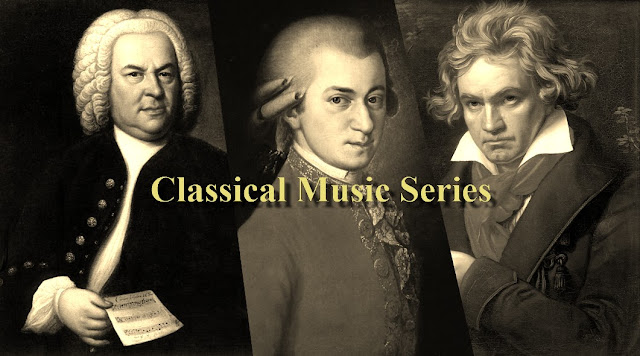This
post is part of my Classical Music Series. Read more about it in the
introduction.
Baroque
is the name given to music composed from 1600 to 1750, a period during which the
foundation was laid not only for classical music, but for Western music in
general. Composers started making use of basso continuo (also known as figured
bass), in which a group of instruments (usually harpsichord, lute and cello)
play a fixed bass line on which the chords and melody are improvised. This
melody was usually played counterpoint, meaning that two melodies differ in
their tempo and direction (for instance one melody going up, while the other
goes down) but still sound harmonious or good together. Probably the most influential
early baroque composer to implement these techniques was Claudio Monteverdi,
who was also responsible for composing one of the earliest still surviving
operas: L'Orfeo.
Thanks
to Monteverdi baroque music gained attention and became highly popular by the mid-1600's.
To be able to satisfy the public demand composers started to downscale the
orchestras hereby creating chamber music, which could be played in smaller
settings. In Italy the most influential composer at the time was Francesco Cavalli,
a student of Monteverdi, who wrote more than 40 operas for small orchestras.
Meanwhile in France Jean-Baptiste Lully, royal composer for king Louis XIV,
mainly focused on ballets and comedies. Lully was also what we would nowadays
call a conductor. He used a large staff to maintain the rhythm. Unfortunately
for him this practice literally killed him. During a rendition of Te Deum he hit his foot with the staff,
which resulted in gangrene and ultimately his death (who'd have guessed being a
conductor was such a dangerous job?!).
Of
course the pinnacle of baroque chamber music is the very well known Canon in D Major by Johann Pachelbel.
Besides being one of the most played classical pieces during both weddings and
funerals its chord scheme also inspired many pop songs over the years including
Ralph McTell's Streets of London,
Green Day's Basket Case and the more
recent Bad Things by Machine Gun
Kelly.
At the
start of the 18th century baroque music reached its apex, with dozens of
composers creating pieces still well known today. If I say for instance "Quattro
Stagioni" you say.... Antonio Vivaldi (or granted, pizza if you're hungry).
The Four Seasons is Vivaldi's most famous work, and rightfully so. He really manages
to capture the feeling of each season in the music. We hear birds in spring,
experience a thunderstorm in summer, join the harvest festivities in the autumn
and seek shelter for the gruelling snowstorm in winter, the last being my
personal favourite. Of course Vivaldi composed many other pieces, mainly
concertos and sonatas, most of which have a very bright maybe even playful
style.
A lot of
Vivaldi's works were transcribed for organ by another great composer: Johann
Sebastian Bach. Bach's works generally sound a bit more serious than Vivaldi's.
This is not because Bach was German, but rather the fact that he composed many
cantatas, masses and passions played in churches which required a more
dignified sound. Nevertheless there are plenty of compositions in his 1000+
work oeuvre which sound uplifting (for example his Brandenburg Concertos).
The last
composer I'd like to mention is George Frideric Handel, for one because he's
one of the first composers I've ever attended a performance from (the
Messiah), but also because he's one of
the greatest composers of the Baroque era. Born in Germany in 1685 (same year
and country as Bach) Handel moved to Italy in 1703 before ending up in London
in 1710. As such even though most of his works have been composed in England
clear German and Italian Baroque influences can be heard in his music. Handel's
most famous work is without a doubt the Hallelujah Chorus from aforementioned
Messiah. Another piece worth listening to is Water Music, composed especially
for King George I who requested a concert on the river Thames.
It's a
difficult feat to try and summarize 150 years of music in such a short post,
but I hope I've managed to peak your interest in Baroque music and maybe even
taught you some music history.
If you
want to hear more baroque music there are fortunately many ways to do so.
YouTube of course is filled with music from all great composers. Some channels
specialise in composers or certain instruments. Plenty of playlists can be
found on Spotify and last but not least you can go old-school and turn on a
classical music radio station. To help you get started I've listed some great
works below.
Several Baroque
masterpieces:
Arcangelo
Corelli Concertogrosso, Op. 6, No. 8 in G minor
Henry Purcell Rondeau fromAbdelazer
Georg
Philipp Telemann Concerto in G major forViola and Strings
Giovanni
Battista Pergolesi Stabat Mater

